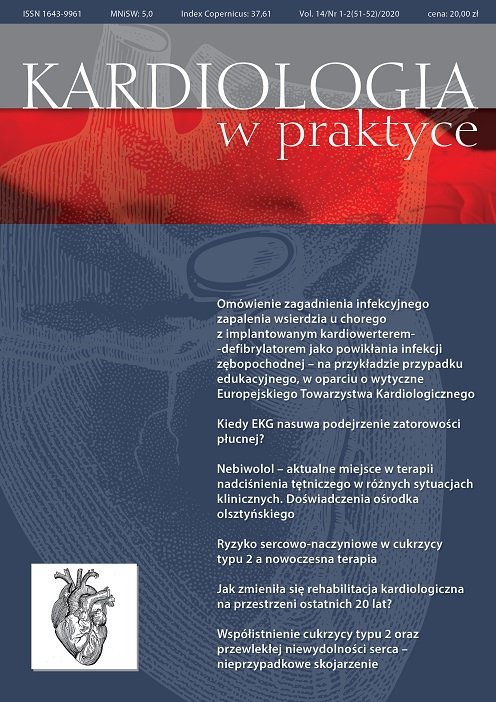Nebivolol and its current place in the treatment of hypertension in the various clinical scenarios. The experience of the Olsztyn center Case report
Main Article Content
Abstract
Nebivolol is a highly cardioselective β-blocker of the III generation with vasodilator properties. Its unique properties, among others in reducing central aortic pressure, make it the preferred β-blocker in current hypertension guidelines. This paper presents clinical cases illustrating the place of nebivolol in the treatment of arterial hypertension and cardiovascular comorbidities.
Downloads
Article Details

This work is licensed under a Creative Commons Attribution-NonCommercial 4.0 International License.
Copyright: © Medical Education sp. z o.o. This is an Open Access article distributed under the terms of the Attribution-NonCommercial 4.0 International (CC BY-NC 4.0). License (https://creativecommons.org/licenses/by-nc/4.0/), allowing third parties to copy and redistribute the material in any medium or format and to remix, transform, and build upon the material, provided the original work is properly cited and states its license.
Address reprint requests to: Medical Education, Marcin Kuźma (marcin.kuzma@mededu.pl)
References
2. Williams B, Mancia G, Desormais I et al. 2018 ESC/ESH Guidelines for the management of arterial hypertension. J Hypertens. 2018; 36: 1953-2041.
3. Tykarski A, Filipiak KJ, Januszewicz A et al. Zasady postępowania w nadciśnieniu tętniczym – 2019 rok. Wytyczne Polskiego Towarzystwa Nadciśnienia Tętniczego. Nadciśnienie Tętnicze w Praktyce 2019; 5: 1-86.
4. Roman MJ, Devereux RB, Kizer JR et al. High Central Pulse Pressure Is Independently Associated With Adverse Cardiovascular Outcome. The Strong Heart Study. J Am Coll Cardiol. 2009; 54(18): 1730-4.
5. Münzel T, Gori T. Nebivolol: the somewhat-different beta-adrenergic receptor blocker. J Am Coll Cardiol. 2009; 54: 1491-9.
6. Grabowski M. Nebiwolol. Medical Education, Warszawa 2012.
7. Van Nueten L, De Cree J. Nebivolol: comparison of the effects of dl-nebivolol, d-nebivolol, l-nebivolol, atenolol, and placebo on exercise-induced increases in heart rate and systolic blood pressure. Cardiovasc Drugs Ther. 1998; 12(4): 339-44.
8. Sorrentino SA, Doerries C, Manes C et al. Nebivolol exerts beneficial effects on endothelial function, early endothelial progenitor cells, myocardial neovascularization, and left ventricular dysfunction early after myocardial infarction beyond conventional beta1-blockade. J Am Coll Cardiol. 2011; 57(5): 601-11.
9. Czuriga I, Riecansky I, Bodnar J et al. Comparison of the new cardioselective beta-blocker nebivolol with bisoprolol in hypertension: the Nebivolol, Bisoprolol Multicenter Study (NEBIS). Cardiovasc Drugs Ther. 2003; 17(3): 257-63.
10. Toblli JE, DiGennaro F, Giani JF et al. Nebivolol: impact on cardiac and endothelial function and clinical utility. Vasc Health Risk Manag. 2012; 8: 151-60.
11. Kampus P, Serg M, Kals J et al. Differential effects of nebivolol and metoprolol on central aortic pressure and left ventricular wall thickness. Hypertension. 2011; 57(6): 1122-8.
12. Pucci G, Ranalli MG, Battista F et al. Effects of beta-Blockers With and Without Vasodilating Properties on Central Blood Pressure: Systematic Review and Meta-Analysis of Randomized Trials in Hypertension. Hypertension. 2016; 67: 316-24.
13. Birenbaum A, Tesse A, Loyer X et al. Involvement of beta-adrenoreceptor in altered beta-adrenergic response in senescent heart: role of nitric oxide synthase 1-derived nitric oxide. Anaesthesiology. 2008; 109(6): 1045-53.
14. Brixius K, Middeke M, Lichtenthal A et al. Nitric oxide, erectile dysfunction and beta-blocker treatment (MR NOED study): benefit of nebivolol versus metoprolol in hypertensive men. Clin Exp Pharmacol Physiol. 2007; 34: 327-31.
15. Doumas M, Tsakiris A, Douma S et al. Beneficial effects of switching from beta-blockers to nebivolol on the erectile function in hypertensive patients. Asian J Androl. 2006; 8: 177-82.

